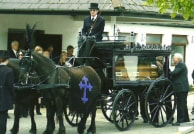|
The Five Stages of Grief
While everyone grieves in their own way, many therapists and other health care professionals have recognized that most people go through a set of common stages of grief. These five stages, set out by Elisabeth Kubler-Ross in her book On Death and Dying, provide grief counsellors with a set of common guidelines to help those who are dealing with loss. Stage One – Denial When something traumatic happens to someone, one of the first natural responses that they will feel is denial. People who find themselves thrust into a situation where they have to deal with grief or with someone who is experiencing grief will notice that one of the first things that can happen is that the person who is attempting to cope with the grief and loss will feel a strong sense of denial. He or she will often not believe that the loss is happened to them so that they do not have to deal with it. People who are going through denial may start to say things like, “This all has to be a dream,” or “This isn’t happening to me.” These are normal responses to a tragedy as many times when we are dealing with death and loss it can be too much to handle at once. The person who is grieving wants to believe that these events are not happening to them and that everything is going to stay the way that it was. Many times the stage of denial is one that hits adults harder than children because children are better adept at dealing with change and coping with powerful circumstances. Dealing with Denial One of the strategies of denial that many people use is to consider their situation to be one similar to a television show or a movie where there is always a plot twist at the end— there’s always that revelation that someone who was thought to be dead is suddenly and miraculously alive. They are waiting for that moment when the police or the doctors tell them that there has been a horrible mix up and that their loved one is not actually the person who died. To them, the story is not complete, and they feel like they have been left with part of a cliff hanger in which they must only wait for the revelation which tells them that there really isn’t any loss for them to deal with. To those who have not experienced this kind of grief it may appear that the stage of denial is a childish way to deal with the loss of a loved one. This is not the case. In fact, denial is an important coping mechanism that helps people deal with this kind of loss in a manner that will allow them slowly and gradually come to terms with the situation. The period of denial is generally a short-lived one, although different people will progress through denial at varying rates. Accordingly, there is no definite period for how long a person will remain in the stage of denial. Helping Someone in Denial If you are dealing with someone who is experiencing this stage of grief then the best thing that you can do is to gently remind them of the reality of the situation. Do not try to be too pushy and convince them that their loved one really did die as this can sometimes cause a stress reaction. In most cases, they will eventually come out of this stage of grief on their own; however, if you are dealing with someone who appears to remain in the denial stage of grief for an extended period of time, you might consider getting them into a type of grief recovery program with a therapist who can gradually pull them back to the situation at hand so they can continue to move through the remainder of the grieving process properly. Comments are closed.
|
View by Category
All
Bespoke FuneralsHandling the CostsTestimonials |
|
Celebrant Training Courses
|
Celebrant Services
|
Useful Links
|
Our NOCN Center Number is ICP Celebrants 30003224
©
The International Corporation of Professional Celebrants Limited. All Rights Reserved. Company No. 12693562 | Web Design by Line of Vision







